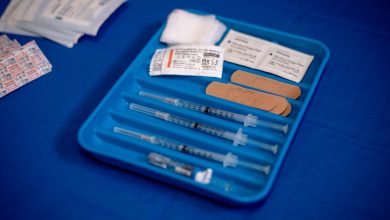Aspirin Can Prevent a Deadly Pregnancy Complication. Why Aren’t Women Told?

The Latest
Baby aspirin is routinely prescribed to people who survive heart attacks. But there’s another vulnerable group who benefit from daily low-dose aspirin: pregnant women at risk of developing pre-eclampsia, life-threatening high blood pressure.
It’s a factor in up to one in 20 pregnancies in the United States, and one of the leading causes of maternal mortality nationwide. Pre-eclampsia is the top cause of maternal death among Black women, who die of pregnancy-related complications at rates almost triple those of white women.
But not enough pregnant women are getting the word that low-dose aspirin can help. Now leading experts are hoping to change that.

Credit…Gary Cameron/Reuters
Back Story: Aspirin reduces the odds of certain complications.
The U.S. Preventive Services Task Force, an influential panel of experts that issues national guidance, has for 10 years been recommending that women who are at risk for pre-eclampsia start taking baby aspirin when they are 12 weeks pregnant.
Both the American College of Obstetricians and Gynecologists and the Society for Maternal-Fetal Medicine support the recommendation, saying low-dose aspirin is safe and not likely to cause complications. The optimal time to start is before 16 weeks of pregnancy, though it can be initiated later, the groups advise.
Those at risk for developing pre-eclampsia include anyone who had pre-eclampsia during a previous pregnancy, as well as those carrying twins, triplets or other multiples; those who have kidney disease, autoimmune disease, Type 1 or Type 2 diabetes; and those with chronic hypertension.
A pregnant woman may also be at risk if she is pregnant for the first time, is 35 or older, has a body mass index greater than 30, or has a family history of pre-eclampsia.
Taking aspirin reduces the risk of pre-eclampsia by 15 percent, while reducing the risk of premature birth by 20 percent and reducing the risk of another complication, intrauterine growth restriction, by 18 percent, studies have found.
The Problem: Women and their doctors haven’t gotten the news.



